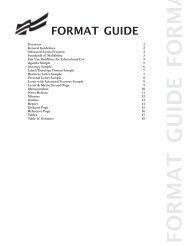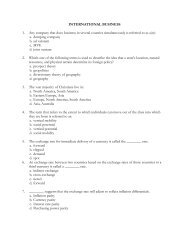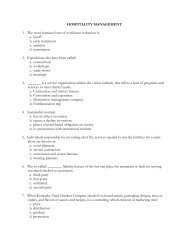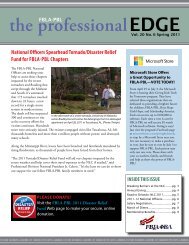School Store: An Operating Manual - FBLA-PBL
School Store: An Operating Manual - FBLA-PBL
School Store: An Operating Manual - FBLA-PBL
You also want an ePaper? Increase the reach of your titles
YUMPU automatically turns print PDFs into web optimized ePapers that Google loves.
Pitfalls<br />
In any business operation there are problems. Most can be avoided or solved by an alert manager/adviser.<br />
If they are not, the school store, like any other business, will fail.<br />
Some pitfalls:<br />
• Dishonesty – Each person involved in a school store operation must be honest. <strong>An</strong>y dishonest person<br />
should be immediately removed.<br />
• Price mistakes – Watch invoices for price changes as they may occur without notice.<br />
• W rong change – <strong>School</strong> store personnel, w h e ther ch i l d ren or adults,should know the proper way to make ch a n g e.<br />
• <strong>School</strong> office or other school organization removing merchandise without paying for it – The office should<br />
be charged. Money may not necessarily change hands, but records – at retail price – should be kept on what<br />
is taken. The school store must pay for all of the merchandise it gets, including those items that are removed<br />
and not paid for. If no record is kept, it is the same as if the item was stolen, with the same effect on profit.<br />
• Wrong ordering – Know what you are ordering and in what quantities.<br />
• Fast talking telephone salesmen – This is a persistent problem. Be careful of anyone with a “great deal for<br />
you”. Sign no order unless you know exactly what you are buying and the quantities and price of the article.<br />
• Imprints – Everybody loves them except the guy who has to pay the bill. The principal, the teachers, and<br />
the PTA all want to build school spirit with imprinted material, which is commendable. Most of the time, of<br />
course, it cannot be returned if it doesn’t sell. Usually there are large quantities involved and if it doesn’t<br />
sell, there are large losses also. Regarding t-shirts and sweatshirts, etc., because there are different sizes,<br />
find a supplier who will sell small quantities.<br />
• Discounts to store workers – The answer is No. By working in the <strong>School</strong> <strong>Store</strong>, they are receiving a practical<br />
true-to-life education in business that is available to very few of their peers. If there is a school letter<br />
or other award, points toward it should be given to the workers.<br />
• Credit to students – No.<br />
• Discounts/Credit to teachers – A decision about this should be made by the principal, perhaps following<br />
recomendations made by the <strong>School</strong> <strong>Store</strong> Board of Directors. The handling of discounts requires a complete<br />
list of special prices. The only other way is to give a certain percentage off the retail price. When the sale is<br />
made, the purchasing teacher gets the original and the duplicate is retained by the <strong>School</strong> <strong>Store</strong>. At the end<br />
of the month the teacher would get a bill. When payment is made, the duplicates are torn out of the sales<br />
book,marked paid,and given to the teacher. Credit should not be extended for more than one month at a time.<br />
• Because the responsibility for the proper operation of the <strong>School</strong> <strong>Store</strong> falls on the shoulders of the<br />
supervising teacher/adviser, this person should have all orders placed approved by him or her.<br />
13






